Learn more about !
THCA vs Delta 8 vs Delta 9: What’s the Difference?
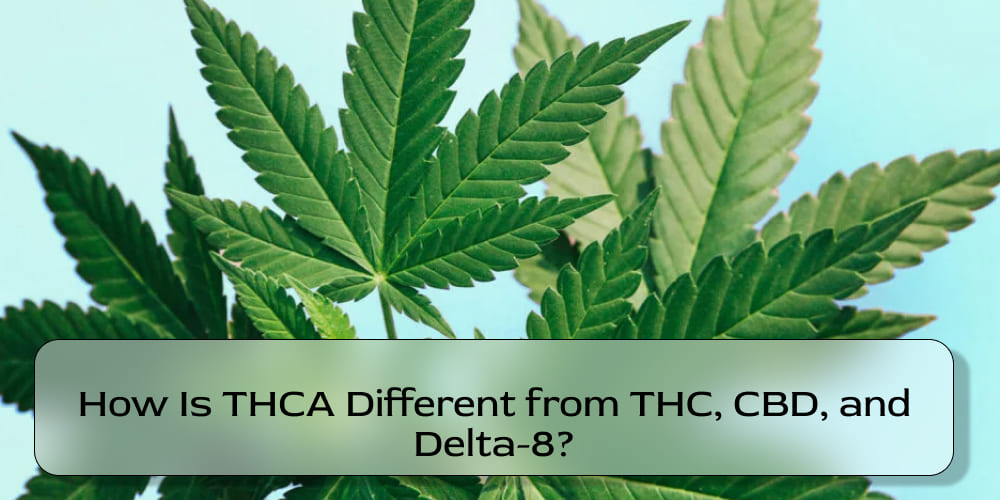
Each year, cannabis becomes more popular and diverse, especially with the growing variety of cannabinoids such as THCA, Delta-8, and Delta-9. Although these substances come from the same plant, they have different properties and effects on the body. If you’re curious about how they differ and which one is suitable for your needs, this article will provide a clear overview of each.
What is THCA?
THCA (tetrahydrocannabinolic acid) is a natural cannabinoid found in raw cannabis. Unlike the more well-known Delta-9, THCA does not have psychoactive effects. It only activates and transforms into Delta-9 when heated—during smoking or cooking. However, even in its raw form, THCA offers numerous beneficial properties.
This cannabinoid is actively used to treat various conditions such as inflammation, chronic pain, and even Crohn’s disease. It does not induce a “high”, making it attractive for those seeking therapeutic benefits without intense psychoactive effects.
In addition, THCA has antioxidant properties and may play a role in preventing neurodegenerative diseases, such as Alzheimer’s disease.
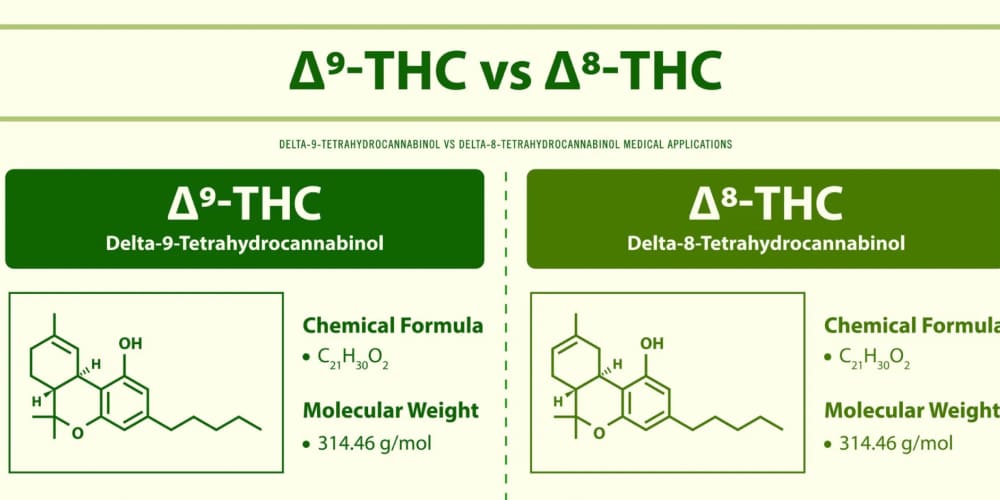
This cannabinoid is actively used to treat various conditions such as inflammation, chronic pain, and even Crohn’s disease. It does not induce a “high”, making it attractive for those seeking therapeutic benefits without intense psychoactive effects.
In addition, THCA has antioxidant properties and may play a role in preventing neurodegenerative diseases, such as Alzheimer’s disease.
Delta-8 THC: Light Relaxation and Calmness
Delta-8 is a cannabinoid that has gained popularity in recent years due to its mild effect. It is chemically similar to Delta-9, but it causes gentler psychoactive reactions. It’s an excellent choice for those who want to experience cannabis effects without the overwhelming euphoria and anxiety often associated with Delta-9.
Top 5 CBD for Post-Workout Recovery
Does Sativa Or Indica Make You Sleepy
Trichomes Why Does Cannabis Produce Cannabinoids
Main benefits of Delta-8 THC:
- Light relaxation and calmness: It helps reduce anxiety and stress without causing intense euphoria.
- Pain relief: It can be effective for people with chronic pain or those seeking mild relief.
- Sleep aid: Ideal for those who struggle with insomnia or other sleep disorders.
- Appetite stimulation: It helps those experiencing a lack of appetite, such as during chemotherapy.
If you need a mild yet enjoyable relaxation without strong psychoactive effects, Delta-8 will be the right choice for you.
Delta-9 THC: Classic Cannabis Effect
Delta-9 THC is the cannabinoid that made cannabis popular worldwide. It is responsible for the intense psychoactive effects most people associate with cannabis use. It induces euphoria, relaxation, enhanced sensory perception, and even appetite stimulation, famously known as the “munchies.”
However, Delta-9 THC isn’t without its side effects. It can cause paranoia or anxiety, especially for those not used to strong psychoactive substances. Nonetheless, many people prefer Delta-9 THC for its distinct effects, such as:
- Euphoria and happiness: A sense of joy and freedom, making it popular among cannabis enthusiasts.
- Enhanced perception: Tastes, smells, and sounds become more vibrant, and the environment is perceived more intensely.
- Appetite stimulation: Ideal for those with appetite issues.
If you want to fully immerse yourself in the cannabis experience and enjoy strong psychoactive effects, Delta-9 will be your choice.
THCA, Delta-8, and Delta-9 THC: What Are the Key Differences?
The main difference between THCA, Delta-8 THC, and Delta-9 THC lies in their psychoactivity and effects on the body. Let’s take a look at their features:
| Characteristic | THCA | Delta-8 THC | Delta-9 THC |
|---|---|---|---|
| Psychoactivity | Non-psychoactive | Mild psychoactivity | Strong psychoactivity |
| Source | Natural cannabinoid, raw cannabis | Synthesized from CBD | Naturally present in cannabis |
| Effects | Pain relief, anti-inflammatory | Pain relief, reduces anxiety | Euphoria, relaxation, enhanced perception |
| Legality | Legal in most countries | Legal in some US states | Legal in some countries and states, illegal federally in the US |
How to Choose the Right Cannabinoid?
Choosing the right cannabinoid depends on what you want to achieve. For example:
- If you need treatment for inflammation or pain without psychoactive effects, THCA is your best option. It will help alleviate symptoms without altering your perception.
- If you’re looking for relaxation without intense psychoactive effects, Delta-8 will be a suitable choice. It provides mild relaxation and anxiety reduction.
- If you want to experience the full cannabis effect with strong psychoactive effects, then Delta-9 is your choice. It will deliver euphoria, relaxation, and enhanced perception.
Potential Medical Benefits of Cannabinoids
Each of these cannabinoids has its therapeutic properties. As already mentioned, THCA has anti-inflammatory and pain-relieving effects, making it ideal for treating chronic pain and inflammation. Similarly, Delta-8 can also be used for pain relief and sleep aid, while its mild action makes it more accessible to people who don’t want to experience strong psychoactive effects.
Delta-9 is widely used for appetite stimulation and pain relief, as well as for reducing stress and anxiety. All these cannabinoids play an important role in medicine, especially for cancer patients or those suffering from chronic pain.
The Growing Popularity of Cannabinoids in the Wellness Industry
Cannabinoids like THCA, Delta-8 THC, and Delta-9 THC are gaining significant attention not only for their recreational uses but also for their potential in the wellness and medical industries. As more research is conducted, the benefits of these cannabinoids become clearer, and they are increasingly being incorporated into health products like tinctures, edibles, and topicals.
With consumers looking for natural alternatives to traditional pharmaceuticals, cannabinoids offer a promising solution. Whether it’s for pain management, anxiety relief, or enhanced focus, THCA and other cannabinoids are becoming more integrated into daily wellness routines. For instance, Delta-8 has been promoted as a more manageable, less intense alternative to Delta-9, which makes it appealing to those who want the therapeutic benefits without the overwhelming effects that often come with Delta-9.

How Each Cannabinoid Affects the Body
Each cannabinoid interacts differently with the body’s endocannabinoid system, which regulates a wide range of physiological processes such as mood, sleep, appetite, and pain perception. Understanding how THCA, Delta-8, and Delta-9 interact with this system can help individuals choose the right cannabinoid for their specific needs.
THCA, being non-psychoactive, works primarily through its anti-inflammatory and neuroprotective properties. It interacts with the CB2 receptors, which are primarily found in the immune system and peripheral tissues. This makes it particularly useful for conditions involving inflammation, such as arthritis or inflammatory bowel disease.
On the other hand, Delta-8 and Delta-9C bind to CB1 receptors, which are located in the brain and central nervous system. This is why both of these cannabinoids are psychoactive, with Delta-9 producing a stronger “high” than Delta-8. However, because Delta-8 has a slightly different chemical structure, it offers a smoother, less intense experience. This may make it a better option for those who are new to cannabis or who want to avoid some of the undesirable effects associated with Delta-9 THC, such as anxiety and paranoia.
Delta-8 THC’s Legal Status and Accessibility
The legal status of Delta-8 is a topic of ongoing debate. While Delta-9 remains federally illegal in the United States (with some exceptions in certain states), Delta-8 exists in a gray area. It is derived from CBD, which is federally legal under the 2018 Farm Bill, and many people see it as a legal alternative to Delta-9. However, the legality of Delta-8 varies from state to state, with some states outright banning it.
Because Delta-8 is less potent than Delta-9
, it has become more widely available in dispensaries and online markets, offering users an accessible way to experience cannabis-like effects without crossing legal boundaries. This is especially appealing to those who are seeking the medicinal benefits of cannabinoids but live in states where Delta-9 remains illegal.

The Therapeutic Potential of Delta-8 and THCA
Both Delta-8 THC and THCA offer exciting potential in the field of medical cannabis. Delta-8 has shown promise in clinical studies as an effective treatment for nausea and vomiting, making it particularly beneficial for patients undergoing chemotherapy. Unlike Delta-9, which can often trigger severe nausea in some users, Delta-8 provides relief with a much milder effect, making it ideal for those in need of anti-nausea treatment without the risk of feeling overwhelmed.
As for THCA, its potential as a neuroprotective agent is being increasingly recognized. Early research suggests that THCA may help protect the brain from neurodegenerative diseases such as Parkinson’s and Alzheimer’s. Its ability to reduce oxidative stress and inflammation in the brain could help slow the progression of these conditions, offering hope for those suffering from such debilitating diseases.

The Future of THCA Cannabis Strains in 2025 and Beyond
As the cannabis industry continues to evolve, the demand for THCA cannabis strains is expected to grow significantly in 2025 and beyond. With an increasing focus on wellness and non-psychoactive alternatives, THCA offers a promising option for those looking to experience the therapeutic benefits of cannabis without the high. Research into THCA’s potential in treating chronic pain, neurodegenerative diseases, and even mood disorders is advancing rapidly. As more states and countries move toward legalization and regulation, the accessibility of THCA strains is likely to increase, allowing a wider audience to benefit from this cannabinoid’s healing properties. Whether you’re seeking relief from inflammation, pain, or other ailments, THCA cannabis is poised to become a mainstay in the wellness industry.
Does Sativa Or Indica Make You Sleepy
The Best Hybrid Weed Strains in 2025
Exotic Cannabis Strains
Conclusion
Each of these cannabinoids—THCA, Delta-8, and Delta-9—has its unique properties and uses. From pain and inflammation relief to improving sleep and reducing stress, their potential in medicine is immense. The choice of cannabinoid depends on what you’re looking for: from mild relaxation to intense psychoactive euphoria. It’s important to understand how each cannabinoid interacts with the body and what effects it produces to make an informed choice for your needs.







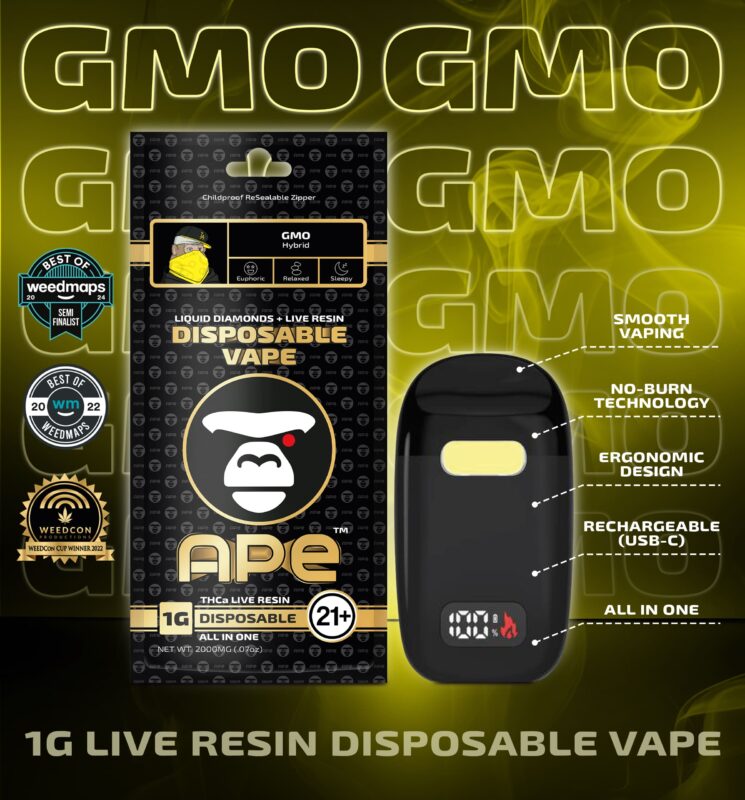

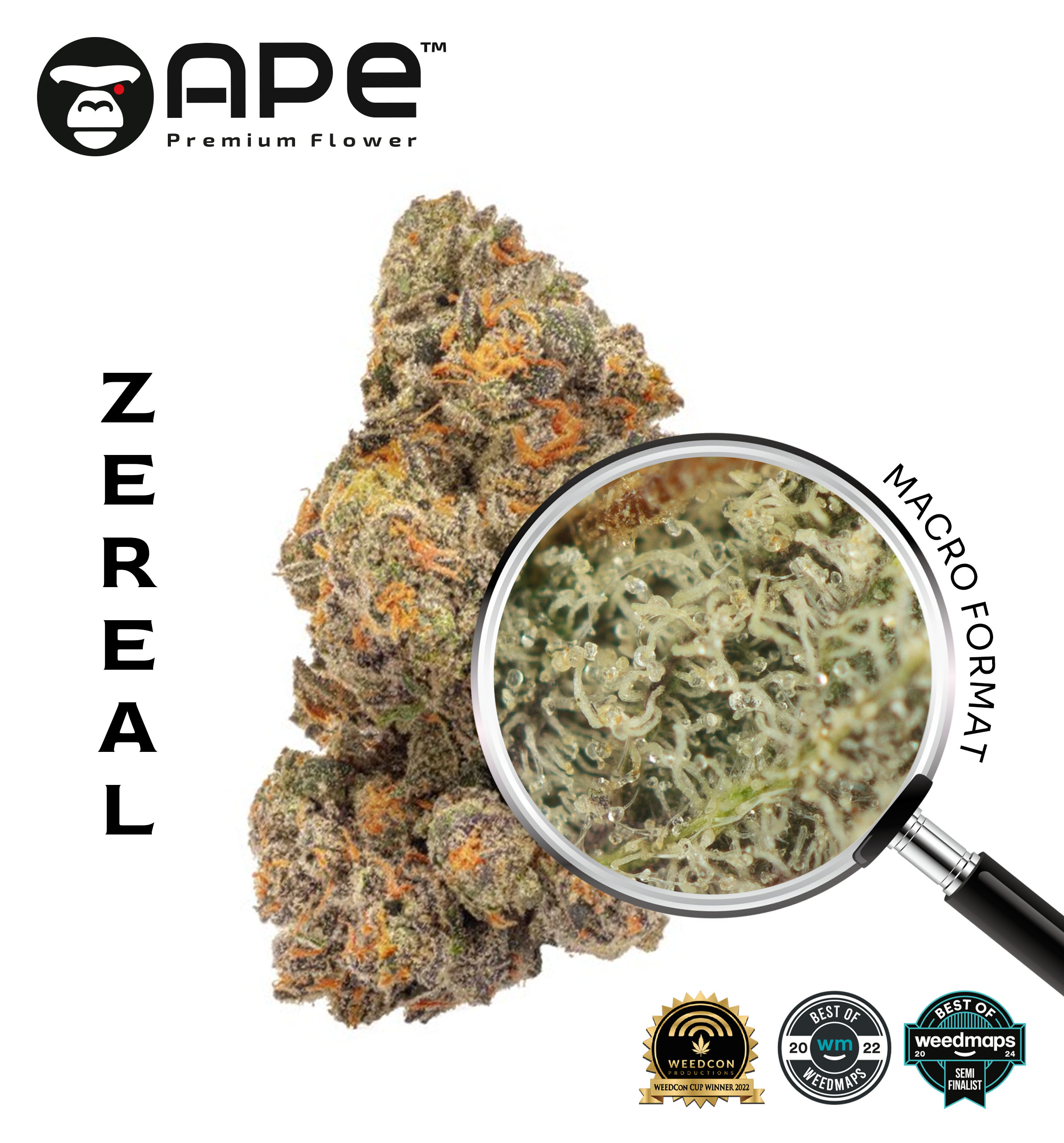

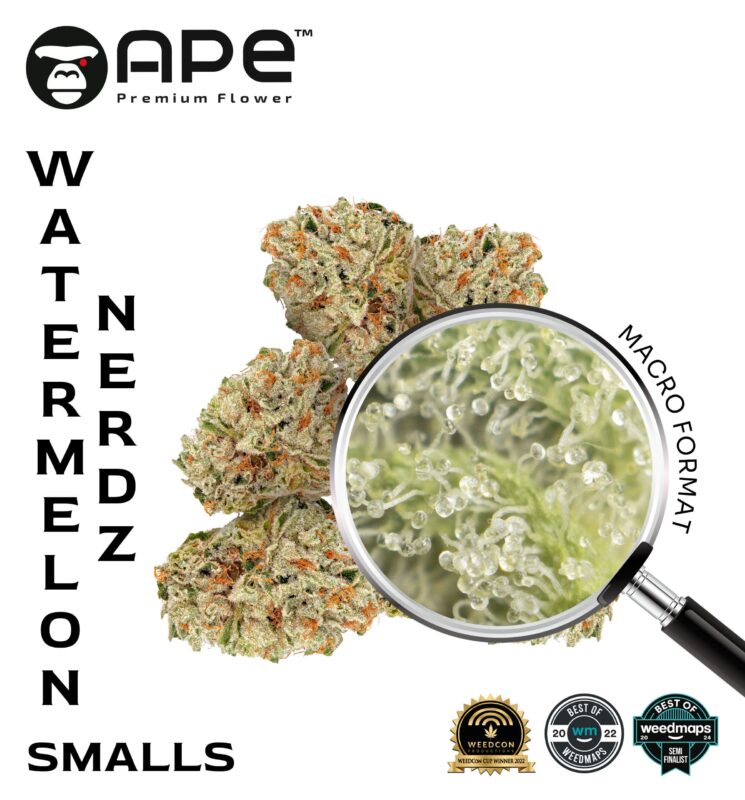


d8 always my go to, d9 hits too hard sometimes lol